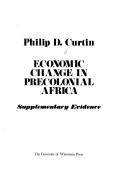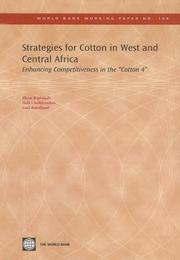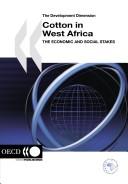| Listing 1 - 10 of 20 | << page >> |
Sort by
|
Book
ISBN: 0582645638 0582645215 0582645212 9780582645639 9780582645219 Year: 1980 Publisher: London: Longman,
Abstract | Keywords | Export | Availability | Bookmark
 Loading...
Loading...Choose an application
- Reference Manager
- EndNote
- RefWorks (Direct export to RefWorks)
Africa, West --- Afrique occidentale --- Economic conditions --- Conditions économiques --- Africa, West - Economic conditions
Book
ISBN: 9221189147 Year: 2006 Publisher: Geneva : ILO Publications,
Abstract | Keywords | Export | Availability | Bookmark
 Loading...
Loading...Choose an application
- Reference Manager
- EndNote
- RefWorks (Direct export to RefWorks)
Summarizes the national reports on the international migration legislation conducted in six West African countries.
Book
ISBN: 0416269001 9780416269000 Year: 1969 Publisher: London: Methuen,
Abstract | Keywords | Export | Availability | Bookmark
 Loading...
Loading...Choose an application
- Reference Manager
- EndNote
- RefWorks (Direct export to RefWorks)
Regional documentation --- West Africa --- Africa, West --- Afrique occidentale --- Economic conditions --- Conditions économiques --- Economic conditions. --- Conditions économiques --- Africa, West - Economic conditions

ISBN: 0299066401 0299066509 9780299066406 9780299066505 Year: 1975 Publisher: Madison (Wis.): University of Wisconsin press,
Abstract | Keywords | Export | Availability | Bookmark
 Loading...
Loading...Choose an application
- Reference Manager
- EndNote
- RefWorks (Direct export to RefWorks)
Slave-trade --- History --- Africa, West --- Economic conditions --- -History --- Africa, Western --- West Africa --- Western Africa --- Commerce --- -History. --- Economic conditions. --- History. --- Slave-trade - Africa, West - History --- Africa, West - Economic conditions
Book
ISBN: 1484326229 Year: 2015 Publisher: Washington : International Monetary Fund,
Abstract | Keywords | Export | Availability | Bookmark
 Loading...
Loading...Choose an application
- Reference Manager
- EndNote
- RefWorks (Direct export to RefWorks)
KEY ISSUES Context. The region continued to experience strong growth in 2014, led by the continued economic expansion in Cote d'Ivoire. The outlook is for further strong growth, subject to a range of downward risks, in particular political instability ahead of upcoming elections in several countries, and security issues in Mali and Niger. With an elevated fiscal deficit exerting pressure on the balance of payments and the regional financial market, delays in fiscal consolidation or structural reforms pose the main medium-term risks. Policy recommendations: Fiscal consolidation. Safeguarding e
Book
ISBN: 9186702076 9789186702076 Year: 1990 Volume: 3 Publisher: Stockholm: Bethany Books,
Abstract | Keywords | Export | Availability | Bookmark
 Loading...
Loading...Choose an application
- Reference Manager
- EndNote
- RefWorks (Direct export to RefWorks)
International economic relations --- West Africa --- Developing countries --- Africa, West --- Economic conditions --- Economic policy --- Developing countries - Economic conditions --- Africa, West - Economic conditions - 1960 --- -Africa, West - Economic policy --- Developing countries - Economic policy

ISBN: 0821371312 9786610940318 128094031X 0821371320 Year: 2007 Publisher: Washington, D.C. : World Bank,
Abstract | Keywords | Export | Availability | Bookmark
 Loading...
Loading...Choose an application
- Reference Manager
- EndNote
- RefWorks (Direct export to RefWorks)
Based on comprehensive empirical studies, the paper identifies key reforms and defines strategies to enhance the competitiveness of the cotton sector in West and Central Africa. Lessons learned from the 1990's suggest that transferring public property to private enterprises is not enough, by itself, to put the sector back on a sustainable path. The cotton sector in most West and Central African countries is critical in terms of its contribution to GDP and exports as well as poverty reduction. Until recently, the cotton sector was characterized by a vertically integrated monopolistic structure,
Africa, West -- Economic conditions -- 1960-. --- Africa, West -- Economic policy. --- Cotton growing -- Africa, West. --- Cotton trade -- Africa, Central. --- Cotton trade -- Africa, West. --- Cotton trade -- Government policy -- Africa, West. --- Cotton trade. --- Cotton trade --- Business & Economics --- Industries --- Textile industry
Book
ISBN: 9782296545342 2296545343 Year: 2011 Publisher: Paris: L'Harmattan,
Abstract | Keywords | Export | Availability | Bookmark
 Loading...
Loading...Choose an application
- Reference Manager
- EndNote
- RefWorks (Direct export to RefWorks)
Depuis plus de cinquante années, la question du développement et de ses fondements épistémologiques et éthiques ne cesse d'occuper tous ceux qui portent à coeur le destin de l'Afrique. Charles Mbadu voudrait renouveler le débat avec un esprit critique et perspicace qu'on lui reconnaît. Son objectif : arriver à dégager les conditions de possibilité du développement par la philosophie, pas n'importe quelle philosophie, mais bien par une réflexion économique et politique portée par une éthique de la militance. Cette éthique émerge à partir de la situation socioéconomique de progression de la pauvreté et de la misère en Afrique, dans l'objectif de forcer tous les Etats du monde à pratiquer la justice vraie. Tant que les Etats les plus riches de la planète se montreront incapables d'oublier les intérêts de leurs Etats nationaux et ne prendront pas en compte les revendications égalitaires présentées par les Etats du Sud, le développement de l'humanité sera fortement compromis.
Political philosophy. Social philosophy --- Africa --- Economics --- Economic development --- Moral and ethical aspects --- History --- Africa, West --- Economic conditions --- Politics and government --- Philosophy --- Economics - Moral and ethical aspects - Africa, West --- Economic development - Moral and ethical aspects - Africa, West --- Economics - Africa, West - History --- Economic development - Africa, West --- Africa, West - Economic conditions - 1960 --- -Africa, West - Politics and government - Philosophy
Book
ISBN: 9264056777 Year: 2009 Publisher: Paris : OCDE,
Abstract | Keywords | Export | Availability | Bookmark
 Loading...
Loading...Choose an application
- Reference Manager
- EndNote
- RefWorks (Direct export to RefWorks)
Les mutations récentes de l’espace mondial remettent l’intégration régionale au cœur de l’agenda politique et économique de l’Afrique. Cet atlas est à la fois le moteur et le résultat d’un travail de réflexion sur l’intégration régionale en Afrique de l’Ouest. Cartes, statistiques et analyses à l’appui, il décrit l’espace ouest-africain, sa population, son peuplement, ses territoires, son économie et ses fragilités. Il mesure le chemin parcouru et les dynamiques d’adaptation à un environnement mondial en pleine mutation. Il identifie les tendances à moyen et long termes et développe une réflexion sur l’avenir.
Africa, West -- Economic conditions -- Maps. --- Africa, West -- Emigration and immigration -- Maps. --- Africa, West -- History. --- Africa, West -- Maps. --- Africa, West -- Population -- Maps. --- Africa, West -- Social conditions -- Maps. --- Africa, West -- Statistics. --- Electronic books. -- local. --- Africa, West --- History. --- Economic conditions --- Social conditions --- Emigration and immigration --- Population --- Africa, Western --- West Africa --- Western Africa --- Development

ISBN: 1281737631 9786611737634 9264025065 9264025057 Year: 2006 Publisher: Paris : OECD,
Abstract | Keywords | Export | Availability | Bookmark
 Loading...
Loading...Choose an application
- Reference Manager
- EndNote
- RefWorks (Direct export to RefWorks)
In West Africa, approximately 16 million people depend directly or indirectly on cotton cultivation. Cotton plays a vital role in the economic and social development of many countries, and in improving the livelihoods of the inhabitants. It has also enabled West Africa to become a major player on the international market, since it is now the second largest fiber exporter behind the United States. This success is partly due to an integrated approach which is often called the "cotton system." Since the World Trade Organization's 2003 Ministerial Conference in Cancun, the actors in the international community have recognized the crucial need to address the cotton crisis in an "ambitious, rapid and specific" manner. At the end of the Hong Kong Ministerial Conference in December 2005, progress was made in the negotiations aiming to reduce subsidies, ensure market access and improve development policies. On 24 July, multilateral trade negotiations of the Doha "Development Round" were suspended because an agreement could not be reached which would satisfy both developing and developed countries. This book contends that dialogue between developed and developing countries should continue in order to find a lasting solution to the difficulties facing the cotton sub-sector. It sets out the regional stakes linked to the economic and social importance of cotton in West Africa. It retraces the consultation process on the West African cotton crisis with the aim of finding a negotiated solution acceptable to all parties. Also discussed are the challenges and the measures that need to be taken over the medium and long term in order to prevent this sub-sector's sudden collapse. Countries covered: Benin, Burkina Faso, Cameroon, Cape Verde, Chad, Cote d'Ivoire, The Gambia, Ghana, Guinea, Guinea-Bissau, Liberia, Mali, Mauritania, Niger, Nigeria, Senegal, Sierra Leone, and Togo.--Publisher summary.
Africa, West -- Economic conditions -- 1960-. --- Africa, West -- Economic policy. --- Africa, West -- Social conditions -- 1960-. --- Cotton growing -- Africa, West. --- Cotton growing. --- Cotton textile industry -- Africa, West. --- Cotton textile industry. --- Cotton trade -- Africa, West. --- Cotton trade -- Government policy -- Africa, West. --- Cotton trade. --- Cotton trade --- Textile industry --- Business & Economics --- Industries --- Social aspects --- Economic aspects --- Textile industry and fabrics --- Textiles industry --- Manufacturing industries
| Listing 1 - 10 of 20 | << page >> |
Sort by
|

 Search
Search Feedback
Feedback About UniCat
About UniCat  Help
Help News
News